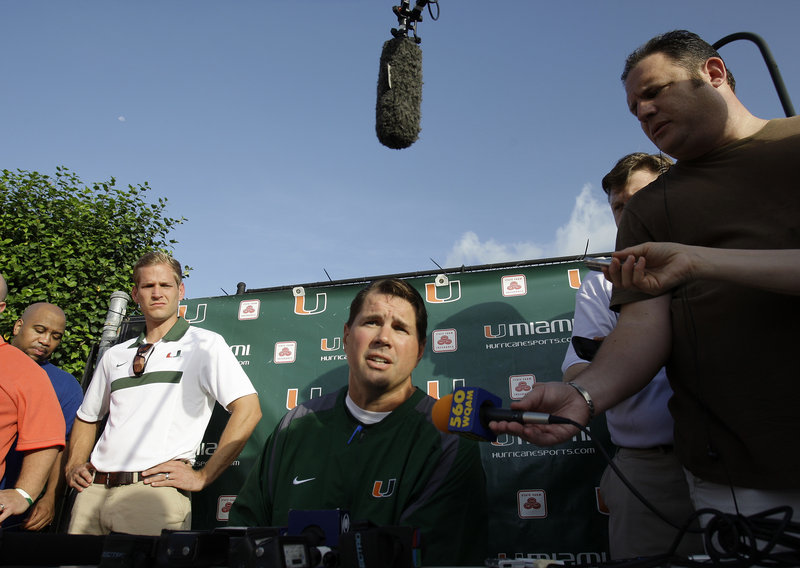INDIANAPOLIS – Mark Emmert, the NCAA president, said Friday he’s willing to back up his tough talk on punishing rule-breakers, even using the “death penalty” as a deterrent.
With salacious allegations swirling around Miami’s football program, and one week after Emmert joined with university presidents to discuss toughening sanctions against cheating schools, the NCAA’s leader said he believed the infractions committee should make the harshest penalty an option.
“If, and I say if, we have very unique circumstances where TV bans and death penalties are warranted, then I don’t think they are off the table and I would be OK with putting those in place,” Emmert said.
Emmert later said the death penalty, which prohibits a school from competing in a sport, should only be used in rare cases. He distanced his comments from the Miami case.
Nevin Shapiro, a convicted Ponzi scheme architect, has said he provided improper benefits to 72 Hurricanes football and basketball players from 2002-10, and a handful of coaches in both programs were aware of the infractions. Yahoo Sports reported the allegations following an 11-month investigation in which it said it audited thousands of business and financial documents, and spent more than 100 hours interviewing Shapiro.
The NCAA has spent five months investigating Miami and calls speculation about penalties for an ongoing case premature.
“I will say that the university is being extremely cooperative and that is extremely helpful,” Emmert said. “But if, and I underline the word if, the allegations are true, that’s extremely disappointing.”
If the allegations are true, it would be the ugliest scandal in college sports in years and the worst during a 18-month span in which the NCAA has looked into football programs at Southern Cal, Auburn, Oregon, Ohio State, Michigan, North Carolina, LSU, Tennessee and Georgia Tech, and basketball programs at Southern Cal and Connecticut. Miami makes both lists.
Yahoo Sports also published a photo of the school president, Donna Shalala, the Health and Human Services Secretary during the Clinton administration, standing next to Shapiro. According to Shapiro’s timeline, the infractions began when Paul Dee, a former NCAA infractions committee chairman, was the school’s athletic director.
While Emmert offered support for Shalala, he declined to comment on Dee.
“She’s been a terrific leader in higher education and I have great respect for her,” Emmert said. “I can only imagine how much she’s struggling with this, like I would have if this had happened on my watch.”
The scope of the allegations has created widespread debate over bringing back the death penalty, which has been used only once, when the NCAA canceled SMU’s 1987 football season because of a pay-for-play scandal. The school also decided not to play in 1988 as it tried to recover.
Schools with two major infractions cases during a five-year period are eligible for the sanction, though the NCAA said the time frame can be expanded if it determines there was a willful intent to break rules.
What happened at SMU has made the NCAA hesitant to use its toughest penalty again.
The Mustangs posted only one winning record over the next 20 years, didn’t reach another bowl game until 2009, and the sanction is believed to have played a part in the breakup and eventual dissolution of the Southwest Conference.
Today, the implications could be even worse.
In an era when conferences have so many tie-ins to bowl games, along with lucrative television contracts, all the schools in a league could lose revenue.
Send questions/comments to the editors.



Success. Please wait for the page to reload. If the page does not reload within 5 seconds, please refresh the page.
Enter your email and password to access comments.
Hi, to comment on stories you must . This profile is in addition to your subscription and website login.
Already have a commenting profile? .
Invalid username/password.
Please check your email to confirm and complete your registration.
Only subscribers are eligible to post comments. Please subscribe or login first for digital access. Here’s why.
Use the form below to reset your password. When you've submitted your account email, we will send an email with a reset code.